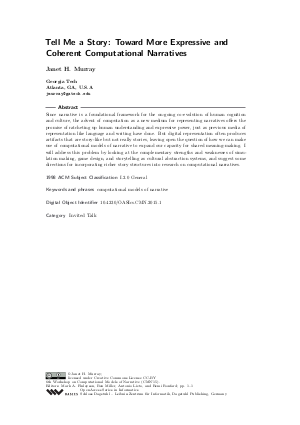Tell Me a Story: Toward More Expressive and Coherent Computational Narratives (Invited Talk)
Author Janet H. Murray
-
Part of:
Volume:
6th Workshop on Computational Models of Narrative (CMN 2015)
Part of: Series: Open Access Series in Informatics (OASIcs) - License:
 Creative Commons Attribution 3.0 Unported license
Creative Commons Attribution 3.0 Unported license
- Publication Date: 2015-08-14
File

PDF
OASIcs.CMN.2015.1.pdf
- Filesize: 200 kB
- 1 pages
Document Identifiers
Subject Classification
Keywords
- computational models of narrative
Metrics
- Access Statistics
-
Total Accesses (updated on a weekly basis)
0PDF Downloads0Metadata Views
Abstract
Since narrative is a foundational framework for the on-going co-evolution of human cognition and culture, the advent of computation as a new medium for representing narratives offers the promise of ratcheting up human understanding and expressive power, just as previous media of representation like language and writing have done. But digital representation often produces artifacts that are story-like but not really stories, leaving open the question of how we can make use of computational models of narrative to expand our capacity for shared meaning-making. I will address this problem by looking at the complementary strengths and weaknesses of simulation making, game design, and storytelling as cultural abstraction systems, and suggest some directions for incorporating richer story structures into research on computational narratives.
Cite As Get BibTex
Janet H. Murray. Tell Me a Story: Toward More Expressive and Coherent Computational Narratives (Invited Talk). In 6th Workshop on Computational Models of Narrative (CMN 2015). Open Access Series in Informatics (OASIcs), Volume 45, p. 1, Schloss Dagstuhl – Leibniz-Zentrum für Informatik (2015)
https://doi.org/10.4230/OASIcs.CMN.2015.1
BibTex
@InProceedings{murray:OASIcs.CMN.2015.1,
author = {Murray, Janet H.},
title = {{Tell Me a Story: Toward More Expressive and Coherent Computational Narratives}},
booktitle = {6th Workshop on Computational Models of Narrative (CMN 2015)},
pages = {1--1},
series = {Open Access Series in Informatics (OASIcs)},
ISBN = {978-3-939897-93-4},
ISSN = {2190-6807},
year = {2015},
volume = {45},
editor = {Finlayson, Mark A. and Miller, Ben and Lieto, Antonio and Ronfard, Remi},
publisher = {Schloss Dagstuhl -- Leibniz-Zentrum f{\"u}r Informatik},
address = {Dagstuhl, Germany},
URL = {https://drops.dagstuhl.de/entities/document/10.4230/OASIcs.CMN.2015.1},
URN = {urn:nbn:de:0030-drops-52742},
doi = {10.4230/OASIcs.CMN.2015.1},
annote = {Keywords: computational models of narrative}
}
